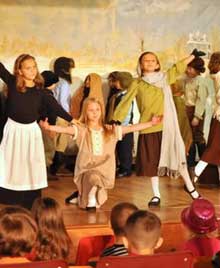 At Holy Trinity Classical Christian School, they’re cultivating virtue, wisdom and eloquence . . . and you can almost always hear someone singing.
At Holy Trinity Classical Christian School, they’re cultivating virtue, wisdom and eloquence . . . and you can almost always hear someone singing.
As any local parent will tell you, Beaufort’s educational landscape is ever-shifting, with charter schools springing up (first Riverview, now Bridges), “choice” programs coming and going (arts-infused, STEM, etc.), teachers and administrators shuffling to and fro, and school zones changing with a frustrating regularity.
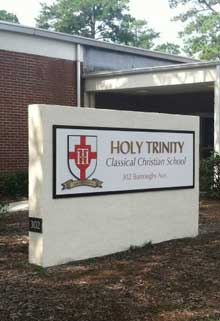 In the midst of all this frenetic activity, you might have missed the fact that a new private school has quietly, albeit joyfully, taken root on Burroughs Avenue in the old district office building where Riverview got its start. In fact, I can’t think of a better phrase than “taking root” to describe what’s going on at Holy Trinity Classical Christian School, where young hearts and minds are being planted in rich soil, lovingly nurtured, and made to flourish.
In the midst of all this frenetic activity, you might have missed the fact that a new private school has quietly, albeit joyfully, taken root on Burroughs Avenue in the old district office building where Riverview got its start. In fact, I can’t think of a better phrase than “taking root” to describe what’s going on at Holy Trinity Classical Christian School, where young hearts and minds are being planted in rich soil, lovingly nurtured, and made to flourish.
Though the vision for Holy Trinity came largely through the leadership of the Parish Church of St. Helena, the school is an entirely separate entity and receives no funding from the church.
Headmaster, Rev. Chad Lawrence says, “You’ll find students here from at least a dozen different churches around town, and our teachers come from several different churches, as well.” Though the school found its first group of students mainly through the Christian community, belief in Christianity is not a requirement for acceptance.
What exactly is Classical Christian education, anyway? When we think “classical,” we tend to think of a time before Christianity, so how do these concepts work together?
Headmaster Lawrence puts it like this: “We are reaching back into the great roots of Western 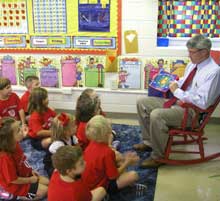 civilization – which, of course, starts with the ancient Greeks and Romans. But Christians, over time, have sought to take the best of those traditions – to plunder the riches therein – and bring them captive to Christ. That’s what we’re doing here.”
civilization – which, of course, starts with the ancient Greeks and Romans. But Christians, over time, have sought to take the best of those traditions – to plunder the riches therein – and bring them captive to Christ. That’s what we’re doing here.”
The classical model of education has a long, proud history in the West. In fact, almost all of the Founding Fathers of this country were classically educated. Holy Trinity is part of a nationwide movement seeking to return to those great roots. At a time when almost everybody agrees that education in America isn’t what it could be – or should be – the leaders of this movement believe the best path forward may well be found in the wisdom of the past.
“Modern education is always searching for the next big thing,” says Headmaster Lawrence. “I learned that when I was a public school teacher in California. After awhile, you knew that each new program, within two years or so, was going to be discarded. So you finally stopped investing much hope in new programs.”
Holy Trinity is investing hope, instead, in a classical teaching model called the Trivium, which dates back to the middle ages. It consists of three phases: Grammar (grades K-5), Logic (grades 6-8), and Rhetoric (grades 9 – 12). Fourth/fifth grade teacher Melissa Bywater explains how – and why – the Trivium works:
“This method appeals to the bent and nature of the child at his or her particular age. During the Grammar stage, they can do a lot of memorizing, and they really enjoy it! Children can learn a ton of information at this age – they just soak it in! – and the Grammar stage caters to that. Then you have the second stage – Logic – which starts in 6th or 7th grade, when they’re naturally starting to ask a lot of questions . . . wanting to think through the ‘why’ of everything and find connections between facts they’ve learned. In the high school years – the Rhetoric phase – they’re now able to communicate those ideas, and they’ve got this great framework and foundation for it. Again, this phase conforms to their natural bent at this stage of development.”
Holy Trinity plans to add a grade each year – starting next year, with grade 6 – but for now, it is very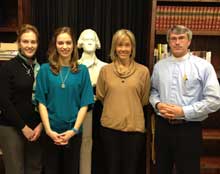 much a “grammar” school.
much a “grammar” school.
“We spend a lot of time learning facts and mastering the basics in grades K-5,” says first grade teacher Lori Hinson. “That’s how God designed the human mind to work at this age, and these children are just thriving on it!”
But it’s not just about memorization and recitation.
“We’re spending a whole year studying insects in 4th grade science,” says Melissa Bywater. “These students know everything about insects! In learning how to ‘go deep’ with this subject, they’re learning how to ‘go deep’ with any subject. In short, they’re learning how to learn.”
Learning how to learn. You hear that a lot at Holy Trinity, where the mission is to cultivate students who know how to think critically, reason clearly, and communicate effectively. One bright avenue down which the school pursues these lofty goals is the arts.
Fine Arts teacher Anna Booman says, “Our focus here is on returning to the good, the beautiful and the true. Art and music are really struggling in the public schools, but they’re a big part of what we do here. At Holy Trinity, you can almost always hear someone singing.”
Not only do the children use singing and chanting to help memorize facts, but they all take extensive music and art classes, where they’re introduced to history’s great composers and artists, even as they learn to make music and art themselves. The school also produces two original plays a year – adapted from short stories by Anna Booman’s sister, Elizabeth, who teaches second grade – complete with singing and dancing.
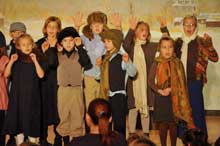 “We don’t see our mission as preparing students to pass a standardized test,” says Headmaster Lawrence. “We want them to be able to learn… to think. Our goal is to cultivate students who are marked by virtue, wisdom and eloquence. And an eloquent person doesn’t just . . . arise. It all starts with doing plays in grammar school. It starts with exposure to music and art and the richest aspects of our culture . . . It starts with being comfortable standing on stage singing in front of your friends, or in a classroom reciting Latin paradigms.”
“We don’t see our mission as preparing students to pass a standardized test,” says Headmaster Lawrence. “We want them to be able to learn… to think. Our goal is to cultivate students who are marked by virtue, wisdom and eloquence. And an eloquent person doesn’t just . . . arise. It all starts with doing plays in grammar school. It starts with exposure to music and art and the richest aspects of our culture . . . It starts with being comfortable standing on stage singing in front of your friends, or in a classroom reciting Latin paradigms.”
That’s right. Latin paradigms. All Holy Trinity students start taking Latin in second grade. When they say “classical,” they mean “classical.”
As for the “Christian” part of the equation, Holy Trinity makes no bones about who – or what – it is. Phrases like “advance the kingdom of God,” “defend the Gospel,” and “develop a biblical worldview” are all over the school’s Mission Statement. Again, belief in Christianity is not a requirement for acceptance to the school, but parents who apply must acknowledge that they’re fully aware this is a Christian school, in every sense of the word.
At a time when Christianity is losing adherents rapidly and is no longer our cultural “default mode” – even in the Bible Belt – Holy Trinity could certainly be seen by some as “countercultural.”
Headmaster Lawrence disagrees with that label. “I’d say we’re truly cultural. We value the great riches of our culture, and our society is no longer valuing those things. So, yes… we’re going against society in some ways; we are going against the grain. My hope is that the fruit that is borne will be the proof that we’re doing the right thing. If we produce citizens who are virtuous, eloquent and wise… well, no matter how much society changes, those things never go out of style.”
For now, as Holy Trinity heads into its first spring, with 100% re-enrollment for next year, the “proof” is in the faces of happy, thriving students… and the words of their parents.
“I cannot speak highly enough of our wonderful school,” says Elinor Gray, who has children in pre-K, 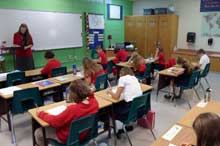 third and fifth grade at the school. “It challenges our children on every level and they have risen to the occasion each time, much to our delight and theirs. On a normal homework night, I’ll listen to their full recitations of insect orders, constellations, books of the Bible, and rulers of Rome. Latin, math, and fabulous tales from Greek mythology follow, with spelling words derived from each class’s current classic work of literature (Chronicles of Narnia, Farmer Boy, Heidi, etc). I never could have imagined that children could learn and retain so much so quickly! Our children approach each subject with a sheer love of learning, something that was not always evident in our previous school.”
third and fifth grade at the school. “It challenges our children on every level and they have risen to the occasion each time, much to our delight and theirs. On a normal homework night, I’ll listen to their full recitations of insect orders, constellations, books of the Bible, and rulers of Rome. Latin, math, and fabulous tales from Greek mythology follow, with spelling words derived from each class’s current classic work of literature (Chronicles of Narnia, Farmer Boy, Heidi, etc). I never could have imagined that children could learn and retain so much so quickly! Our children approach each subject with a sheer love of learning, something that was not always evident in our previous school.”
Carrie Carper, whose kids are in pre-K and second grade at Holy Trinity, couldn’t agree more. “My older son has changed his academic environment every year since he was 2 years old,” she says. “Day care, public school, you name it, he’s done it. And I can honestly say I have never seen him like this! His whole little person just… wants to know! He wants to learn! He’s waking up talking about it; I think he’s dreaming about it. He’s teaching me things. He’s absorbing all this information, and he’s proud of himself. He has a sense of school pride, too. He feels like he has a home here. So, I see a change in his academic ways, but I also see a change in his heart. That’s by far the biggest part.”
Headmaster Lawrence says, “Unfortunately, some people think of classical education as stodgy, boring, and robotic . . .”
“I know this,” he continues, laughing, “because when they come in to tour our school, they always leave saying, ‘This is so different than I thought it would be!'”
For more information about Holy Trinity Classical Christian School, or its application process, please visit www.htccs.org or call 522-0660.






